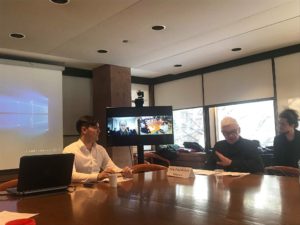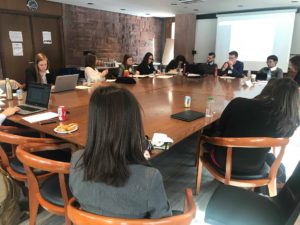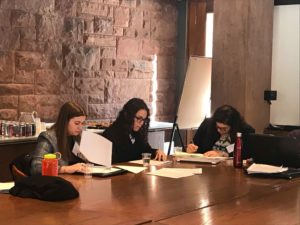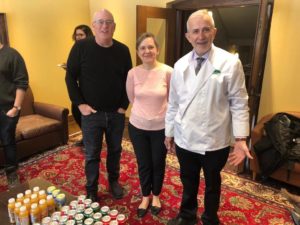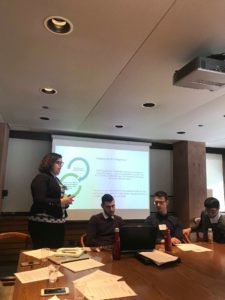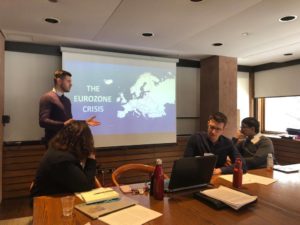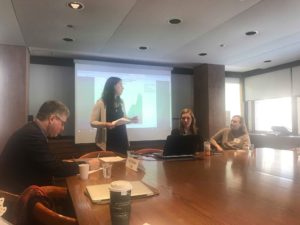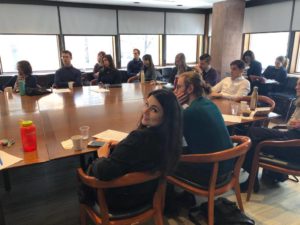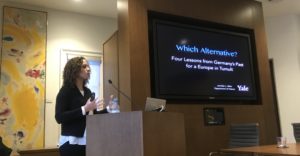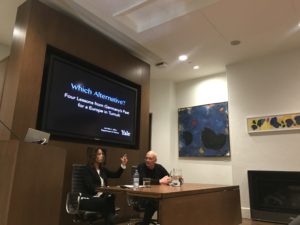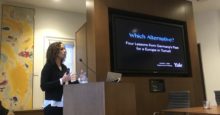On March 7, 2019, graduate students at the Centre for European, Russian, and Eurasian Studies (CERES) concluded their annual Graduate Student Conference, Power Transitions in Europe and Eurasia, at the Munk School of Global Affairs and Public Policy. This year’s conference brought together interdisciplinary research on regime and state power transitions in Europe and Eurasia between 1900 and the present. The conference held four panels: “Power Dynamics in Eurasia and Former Soviet States,” “Gender and Power in Central Europe and the Balkans,” “Migration and Populism in the EU,” and “Ukraine and its Neighbours.” Munk School Interim Director Prof. Randall Hansen praised the conference for its scope, which for the first time included a panel on gender studies in the region. Migration and populism in the EU were also main focuses of the work presented, with five students presenting papers on contemporary challenges to the European project such as the migration crisis, Euroscepticism, and the rise of the far right. The conference brought together panelists of several disciplines, from London, Kyiv, Vilnius, and Oslo, along with students from several departments at the University of Toronto and other Canadian universities.
The day concluded with keynote address by Jennifer L. Allen, a historian of Germany and associate professor of history at Yale University. The lecture enjoyed a full audience of enthusiastic student participants, faculty members from CERES, and members of Toronto’s consular corps. Her presentation, entitled “Which Alternative? Four Lessons from Germany’s Past for a Europe in Tumult,” examined a Germany apparently in crisis and placed the situation in the context of broader historical patterns. She explained that Germany finds itself at the heart of discussions on power, and this centrality has stimulated scepticism on German dominance of the European project. In a review of German and international media coverage of Germany and Merkel’s position in the world, Prof. Allen focused on two main areas: the refugee crisis (and its fallout) and Europe’s political future. She argued four related theses looking at historical patterns within German politics and society: first, that the refugee crisis is not novel; second, that today’s far-right political alternatives are functionally analogous to the leftist alternatives of the 1980s; third, that the exigencies of political power will temper the far right’s impact in German parliament; and last, that contemporary xenophobia has revitalized discourses of difference.
Professor Allen eloquently concluded the conference with a final observation on the state of German politics and power, noting, “In fact ‘power transitions’ was the wiser name for this conference, perhaps the changes Germany has been facing are very much a power transition rather than crises.”
This conference was co-funded by the DAAD with funds from the German Federal Foreign Office and the Erasmus+ programme of the European Union. The students of the CERES MA program and the conference organizers are also deeply grateful to them for this support as well as to the many units at the University of Toronto who made generous contributions:
Anne Tanenbaum Centre for Jewish Studies
Centre for the Study of France and the Francophone World (CEFMF)
Department of Political Science
Department of Slavic Languages and Literatures
Hungarian Studies Program (CERES)
Munk School of Global Affairs and Public Policy
Petro Jacyk Program for the Study of Ukraine
Robert F. Harney Program in Ethnic, Immigration, and Pluralism Studies
Trudeau Centre for Peace, Conflict and Justice
University of Toronto Graduate Students’ Union
Overview of Panelists and Presentations
Panel 1: Eurasia
Alexis M Lerner presented her paper, “Competition in Hybrid Regimes: A Post-Soviet Study,” which explored different political regimes across the former USSR, from the Baltics to Central Asia. The regime types vary from parliamentary republics to fully authoritarian states. Some of these states hold elections regularly but in some, the leaders have been ruling since the fall of the USSR or for prolonged periods of time. Her research focuses on what are known as hybrid regimes, particularly on cases where democratic institutions are used for authoritarian purposes. She examined how these regimes deal with opposition and dissent by exploring a data set of presidential candidates between 1991 and 2018 to identify four different strategies: repression, co-optation, legal, or public repression.
Lauren Hogan presented her policy research on “China-Russia Relations and Natural Gas Pipelines in Siberia.” The case study explores the “Power of Siberia” pipeline, which connects Russian producers with Chinese markets and oil fields. Hogan argued the relationship is unbalanced and, in the long term, a strategic vulnerability for Russia. Hogan identified three factors that must be present for the relationship to be advantageous to Russia: the partner country must have a smaller economy than Russia, a percentage of trade with Russia that is larger than Russia’s percentage of trade with the country in question, and no diversity of energy resources. She finds this is not the case for China, which has a larger economy, a small percentage of trade with Russia (2% versus 11%), and a diversity of energy resources that Russia does not have.
Thea Hilding from Oslo presented “History Politics in Kazakhstan, The 550th Anniversary of the Kazakh Khanate: Geopolitics of Nation Building?” Her research, the first of its kind on the Kazakh state, explores how (political) actors use and manipulate historical narratives for achieving political goals. Although all nation states engage in history politics, it is particularly important for new states. It is nonetheless practiced everywhere as all societies re-evaluate historical narratives, for example to include the contributions of minorities that were previously erased or forgotten. In Kazakhstan, Hilding argues that narratives around the Kazakh Khanate, celebrations with defined traditions and national imagery and perception of what the Khanate looked like are all prominent aspects of Kazakhstan’s history politics.
Panel 2: Gender and Power
Katharine Petty’s paper explored the gruesome yet important topic of “Sexual Violence in the Bosnian War: Testing the Dehumanization Thesis.” The paper aimed to refute the idea that dehumanization is a frequent or even necessary element for the perpetration of extreme violence. In the context of wartime violence, the paper refutes common notions of humanism and thus how it enables dehumanization. Petty then applied this argument to women’s testimonies of sexual violence in the Bosnian War in order to demonstrate that such violence in fact relies on the humanity of the victim. The conclusion is significant for understanding the dynamics of extreme violence.
Cristina Baciu presented on “The Impact of Democratization on Women in Romania.” in which she emphasized the double burden of women under communism. Her paper explores the changing expectations from the state and thereby opportunities for women in Romania under both communism and democracy. Baciu explained the low participation rates of women in politics and other discrepancies after democratization, which demonstrated that state objectives impacted gender equality and the status of women.
Emily Lalande presented on the “Lack of Representation of Hungarian Women in Parliament Presentation.” This paper discussed the lack of representation of women in the Hungarian National Parliament up to March 2018 and, in particular, the way in which the legacy of state socialism in Hungary has uniquely impacted the “woman question” and women’s engagement in national politics. Lalande traced the history of political women under state socialism in Hungary and the post-war period as a path toward a situation where only 10% of parliamentary seats are filled by women. It looks at how state socialism impacted women’s representation in Hungary’s national government through the lenses of education, “women’s issues,” gender stereotyping, and mentorship. Lalande concluded that Hungary’s state socialist past must be appropriately addressed and interrogated in order to understand why the “woman question” in Hungarian parliament remains so unresolved and understudied today.
Panel 3: Populism and Migration in the European Union
Nicola Agostino presented on the “Eurozone, Refugee, and Sovereign-State Crises in the EU” where he tackled major threats to the European project. Agostino argued that the conditions caused by the Eurozone crisis, European refugee crisis, and the sovereign state crisis have exacerbated Euroscepticism and therefore has had detrimental effect on the integration aspirations of the European project. Ultimately, he finds that the transformative political ideologies of radical populists are the biggest threat to collective co-operation toward the European project.
Luka Dursun presented a paper entitled “A Comparative Analysis of Migrant Integration and Language Policies in the EU.” Dursun explained that he first sought to explore the best way for a state to foster language learning among migrants, a policy approach that is believed to stimulate integration and inclusion in a new society. In a study on the Netherlands, France, and Germany, he found that mandatory language courses and testing were the most common policy prescriptions. Such mandatory language policies are often ineffective in achieving the desired results of integration, however, and they often play into normative perceptions of how assimilation should operate rather than how it actually does. The result is that these policies instead work to restrict unwanted immigration rather than promote integration.
Farah Rasmi presented on “Anti-Semitism and the Migration Crisis in Hungary” in which she used qualitative research she conducted in Budapest to explore the political campaigns of the Fidesz party that demonized Jewish-Hungarian billionaire George Soros. Amidst rising xenophobia, the anti-Semitic campaign against Soros sought to accuse him of being behind the refugee crisis, and gave the public a new, clear target that caused shock waves in the country’s Jewish community. Rasmi found that anti-Semitism and its effects on the Jewish community are an unintended consequence of the politics of hatred in the current Hungarian dialogue.
Benson Cheung presented on “Co-opting the Left: Radical Right and Anti-Migrant Discourse from the European New Right to Populist Parties.” In this paper Cheung examines the case of Nouvelle Droite and the European New Right to identify how the far right rehabilitated and even became mainstream. The first section of the essay focuses on the ability of the Nouvelle Droite to refashion fascism into innovative new frames, through looking at successive changes to the ideology by different affiliated intellectuals. The second section of the essay looks at how the ideas in the first section get filtered and mainstreamed into the right populist political arena. Cheung finds that the radical right’s non-party sector has the potential to influence the political arena in two ways: through adapting the fascist core to new contexts, and then diffusing those ideas by top-down ideation within populist parties and by bottom-up grassroots social activism.
Rachel Glowinsky and Talene Torigian presented on “The Migration Crisis: Memories, Myths, and Meanings of Homeland to Jewish and Armenian Diaspora Communities.” Using qualitative research methods, Glowinsky and Torigian examined the relationship of diaspora communities to their respective homelands in the context of conflict and pressure to migrate. They chose the case studies of the Ukrainian-Jewish diaspora during the Donbas war and the Syrian-Armenian diaspora during the Syrian civil war. They found that the concept of ‘homeland’ only exists in a group’s collective memory. It is not a physical place, but rather, a communal point of identity building. Homeland is only meaningful to its selected group, so long as the group believes it to be so.
Panel 4: Ukraine and Its Neighbours
Yevheniia Hasai presented “The Image of Ukraine in English, Russian, and Ukrainian Media in a Cross Linguistic Study” using a comparative analysis of metaphorical language in English, Ukrainian, and Russia media to identify cultural and political implications for the Donbas War. She found that the word “Ukraine” is more metaphorical than “Russia” or “Kyiv.”
Yaromyr Udod presented “A Comparative Analysis of Oligarchy and Politics in Ukraine and Russia,” which pursued a comparative examination of the role of oligarchs in present-day politics in Russia and Ukraine. He found that oligarchs in Russia and Ukraine still remain the most powerful economic elites in their countries but that political influence and participation in each of those countries is markedly different. Both countries’ oligarchs face instabilities whether it is a pressure from their central government or rapid political changes that affect business.
summary by Turina Simanduyev, CERES MA candidate and conference co-chair
- Prof. Jennifer Allen of Yale University delivers the CERES GSC 2019 Keynote Address
